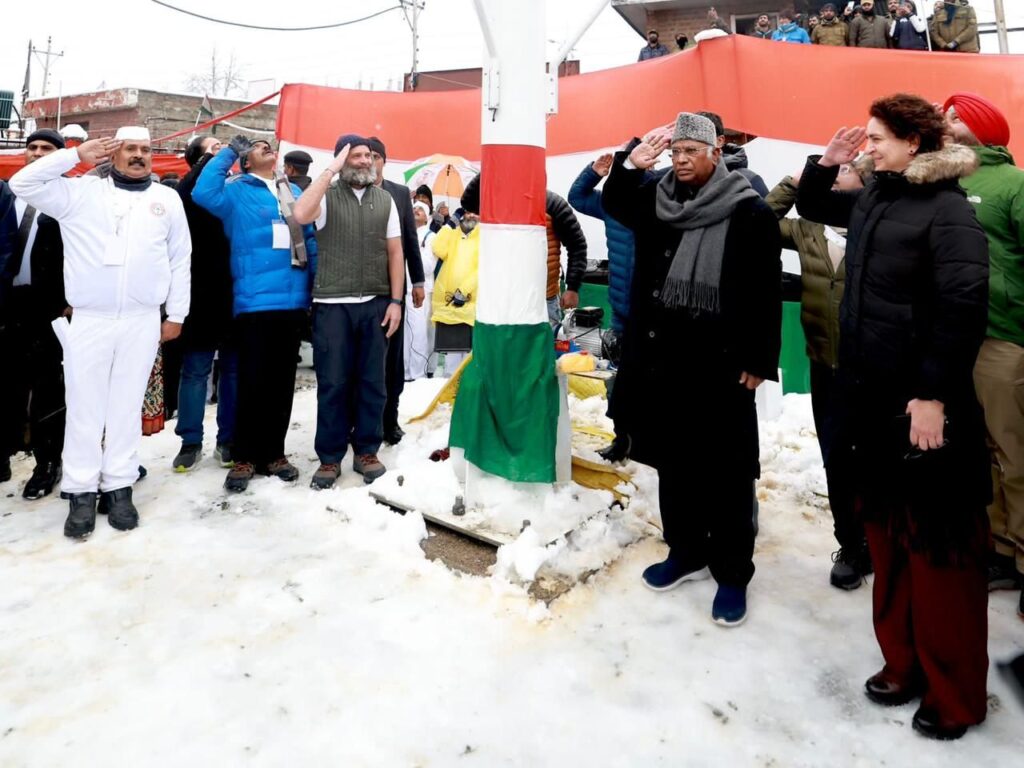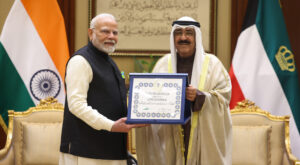
File photo of this year's Republic Day celebrations by Congress leaders in Srinagar
 By G Krishna Mohan Rao*
By G Krishna Mohan Rao*
New Delhi: After Bharat Jodo Yatra, again there is an upbeat mood in the Congress Party, with the three-day All India Congress Committee (AICC) plenary session starting this Friday (February 24, 2023) in Raipur. This session assumes political significance since it will lay down the blueprint for the future course of action, in view of the crucial assembly elections in five big states followed by General Elections next year. Veteran Congressmen feel that the party can only move forward to take on the BJP if its original vote base of Brahmins, Dalits and Muslims becomes its main support backup.
Obviously, the spotlight which was on Rahul Gandhi during his Bharat Jodo Yatra may now shift to party chief Mallikarjun Kharge.
Over the past years, the Congress has become immensely weak organisationally and therefore has been losing one election after the other with a few exceptions which are largely on account of local and regional reasons. Overall, in order to take on the might of the Bharatiya Janata Party, the Congress Party needs to strengthen itself from the block and district level upwards.
Party general secretary in charge of the organisation, K C Venugopal stated that around 15,000 people have been invited to the plenary, which will end on February 27 with a public rally. The tagline of the plenary — Haath Se Haath Jodo— underlines the purpose of the whole exercise which is gearing up the party for the 2024 Lok Sabha polls. Out of these 15,000, elected AICC members will be 1,338; co-opted will be 487, which means the total number of AICC members will be 1,825, while elected Pradesh Congress Committees will have 9,915 members and co-opted 3,000.
The plenary will discuss the alliance question but is unlikely to make any dramatic shift from the existing position. The plenary will be more about strengthening the organisational structure by implementing the plans drawn up at the Udaipur “Chintan Shivir” and incorporating the experience of the Bharat Jodo Yatra.
Sources say that an amendment to the party constitution is being brought at the Raipur session, to reflect the spirit of Udaipur Chintan Shivir. There would be radical changes to overhaul the party’s organisational social profile. The new amendment would enable 50% positions, right from Congress Working Committee downwards, to be reserved for SC/ST/ OBC/ Minorities/women. Out of which 25% should be for members below the age of 50 years. the remaining 50% of positions for the “general or open category “ should have 25 % members below the age of 50 years. This will fulfil the Udaipur resolution of having half of the office bearers, from AICC downwards, below the age of 50 years.
Meanwhile, the All India Congress Committee (AICC) headquarters here at Akbar Road has worn a festive look with hundreds of Congress workers and leaders thronging the party office to clear last-minute doubts and seek directions and guidelines from the leadership. One can see a lot of excitement on the faces of Congressmen, while they are going through the latest updated AICC delegates list for the plenary session.
The AICC sessions were always looked upon as occasions which would rejuvenate the party further. What started happening was that due to reasons best known to those who were likely to speak in favour of the leadership were provided with an opportunity and it was not a free expression forum any longer. The highlight of the AICC plenary would always be that the members mixed freely with office bearers, MPs, MLAs and colleagues who occupied ministerial positions. The lunch and high tea or breakfast were all at the same venue. However, over a period of time, different enclosures were set up which would barricade the common member from having access to the leadership. Everyone ate at the designated places and those in control remained unapproachable to the ordinary member.
Many senior Congressmen feel that Mallikarjun Kharge has immense experience and he would do a great service to his party if he ends this and once again makes the session a forum where any grievances can be voiced openly and those invited to have complete access to the party functionaries. There is certainly no need to have excessive office bearers and only those who have contributed to the party should be brought in to strengthen the organisation on merit and not because they were close to one political leader or the other.
Some other leaders expressed their view that elections to the Congress Working Committee should be held in order to make this high-powered body both meaningful and effective and not comprising sycophants and rootless people. If the Congress has to be strengthened, its supreme bodies should have members with gravitas and not merely those who make it there because of their proximity to influential people within the organisation. It is also a subject of speculation whether the Congress Parliamentary Board (CPB) would be revived at the session.
*Senior journalist





